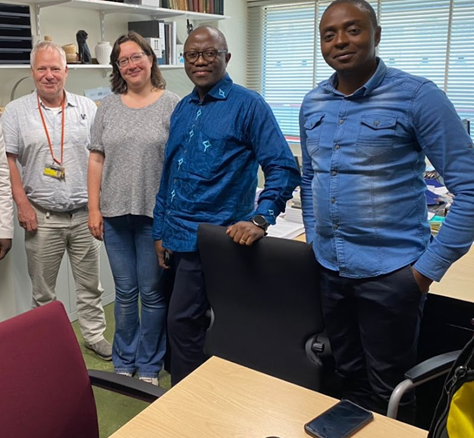Recently, several prestigious prizes and grants have been awarded to our AII members. Learn more about these accomplished individuals and their projects in the article below!
European Union Grant, Child Development After Anti-Malaria Treatment During Pregnancy – Dr. Petra Mens en Dr. Henk Schallig
An African-European research consortium, led by Dr. Petra Mens and Dr. Henk Schallig from the Laboratory for Experimental Parasitology of the department of Medical Microbiology and Infection Prevention, has secured a €1.5 million grant from the European Union. The funding will support a study on the neuro-cognitive and motor development of young children whose mothers received anti-malaria treatment during pregnancy.
While many pregnant women in Africa are treated with anti-malaria drugs to prevent malaria, the impact of these treatments on their newborns remains unclear. Although the drugs are considered safe and effective for the mothers, their effects on the development of their children have not been thoroughly studied.
The consortium will monitor the development of these children for one year after birth to assess whether they develop normally. This research aims to provide crucial insights into the safety of various anti-malaria medications, including a new drug under evaluation. PhD students Japhet Kabalu from the Democratic Republic of Congo (DRC) and Moussa Djimde from Mali will partly conduct the study.
For more information, take a look at this website on malaria in pregnant women.
 Part of the project team, from left to right: Dr. Henk Schallig, Dr. Petra Mens, Dr. Hypolite Mavoko (PI in DRC) and Japhet Kabalu (PhD student from DRC)
Part of the project team, from left to right: Dr. Henk Schallig, Dr. Petra Mens, Dr. Hypolite Mavoko (PI in DRC) and Japhet Kabalu (PhD student from DRC)
KWF grants for fundamental research
Prof. Derk Amsen - Is local support from CD4 to CD8 T-cells in tumors the key to more effective cancer immunotherapy?
Prof. Amsen has secured a €906,164.76 grant from the Dutch Cancer Society to address CD8 T cell exhaustion in tumors. These immune cells are critical in cancer defense and are key players in immunotherapy. Prof. Amsen's research may eventually lead to more potent adoptive T cell therapies against solid tumors, potentially improving patient survival rates.
While T cell immunotherapy shows promise in cancer treatment, many patients remain uncured. One significant obstacle is the loss of T cells' ability to kill cancer cells once they infiltrate the tumor. Understanding the regulation of this process offers new avenues for sustaining anti-tumor responses and improving therapeutic effectiveness.
Prof. Amsen will investigate the role of CD4 T helper cells in preserving the functional activity of CD8 T cells within tumor tissues and unravel the involved molecular pathways, particularly focusing on Notch receptors. Additionally, he will explore whether Notch activation synergizes with checkpoint inhibition therapies.
Derk Amsen's research aims to enhance immunotherapy and potentially other forms of adoptive T cell therapy, such as TIL therapy (Treatment with Tumor-Infiltrating Lymphocytes).
 Derk Amsen, professor of Molecular T-Cell Immunology
Derk Amsen, professor of Molecular T-Cell Immunology
Dr. Renske Steenbergen - Investigating the transition from HPV-induced precancerous stages to cancer utilizing preclinical models.
Dr. Steenbergen has obtained a €767,391.95 grant from the Dutch Cancer Society to study the progression from HPV-induced precancerous stages to cancer using preclinical models.
Frederique Paulus appointed as Professor of Intensive Care
Extensive research has shown that ventilation, while effective and sometimes even lifesaving, can also be harmful. The way in which ventilators are set up, for example, can influence patient outcomes.
"We want to focus on optimizing ventilation and airway care interventions, with the aim of implementing lung-protective strategies." According to Prof. Paulus, it is important to apply treatments that have been proven effective and improve patient outcomes, while avoiding unnecessary or potentially harmful interventions.
The complexity of Intensive Care Unit (ICU) care requires an interprofessional approach, where doctors and nurses collaborate to provide optimal care, Paulus states in her inaugural lecture. Her professorship will play a crucial role in advancing scientific knowledge to optimize the future of ICU care, with special attention to the role of ICU nurses and improving their autonomy in the care process.

